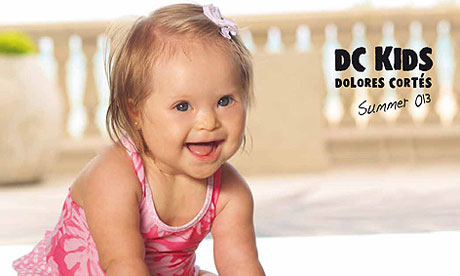
Nicola Clark, a mother of two disabled girls and a campaigner on the issue of promoting positive attitudes towards disabled people, writes an article about the lack of disabled talent on our television screens. This is in response to Valentina Guerrero, a 10-month old baby with Down's Syndrome, becoming the face of a Spanish designer's baby collection ad campaign.
Reposted from The Guardian
When I launched my campaign 'Don't play me, pay me' in 2008, the notion of a disabled model being the new face of a designer swimwear label was exactly the type of "investment in people" I had in mind. Admittedly the new Miami-based model with Down's syndrome, Valentina Guerrero, who appears on the cover of a US catalogue for Spanish designer Dolores Cortés's new collection is only 10 months old. The idea of an adult model routinely featured in any advertising campaign, let alone one built around the fragile notion of conventional beauty, is still years away, but it is, as they say, a start.
My reasons for the campaign came about because my daughter, Lizzy had just been cast in Dustbin Baby for the BBC. This was the exception not the rule and I wondered where were all the disabled people in TV and advertising.
Disability is nowhere to be seen.
Steps have been taken to challenge this. Gok Wan's How To Look Good Naked on Channel 4 has robustly embraced the notion of diversity and aside from the disappointing eponymous addition of the tag "with a difference" there is some slow tentative appreciation that certain people are being excluded. It's still niche though. As part of my research for my campaign I contacted the Office of National Statistics because I reasoned it would hold all the stats I needed to demonstrate that disabled people as consumers are worth appealing to. I was told that they couldn't help with this kind of information. Eh? Disabled children and adults play with toys, eat, sleep, shop and go on holiday, they wear clothes, and drive cars like we all do. I feel that in a time of austerity the absence of disabled people from our media is not just an exclusion, leaving the field clear for comics like Frankie Boyle to control the narrative. It's more worrying than that. There is a growth industry. Hate crime is really flourishing at the moment. As we all tighten our belts and look to our own concerns, we're already turning away from people who from birth, or from an accident or sickness, are vulnerable to the scapegoating blame game that austerity seems to require. How much easier it is to disenfranchise invisible people. How much more difficult if disabled people are not "the others" who we never invite to our dinner tables. If inclusion prompted recognisable faces from the telly then wouldn't this reduce ignorance and ultimately encourage an acceptance of disabled people more widely.
As the Olympics arrives the Paralympians are taking their place, well used to demonstrating excellence as standard. Lady Grey-Thompson has held the hopes and dreams of Team GB repeatedly in her hands with 11 gold medals. Quite rightly she is many people's choice to light the stadium flame to start the games. We can achieve disabled celebrities in sport, why not in every aspect of life?
Whether behind or in front of the camera there is equality of talent and creativity in the hearts and minds of disabled people as with anyone else. They just need the same opportunity to demonstrate it. No doubt as she grows Valentina Guerrero will hear constantly about the "groundbreaking" inclusion that she won't remember – the one that her baby years offered her but her progression to adulthood may have precluded. It would be lovely to believe that by the time she becomes an adult any dreams she may harbour of a career in entertainment, easily realised for her non-disabled peers, might actually become a reality for her too.
For regular news, updates and opportunities, follow us on Twitter at @Scene_TV and 'Like' the Facebook page: www.facebook.com/SceneTV

